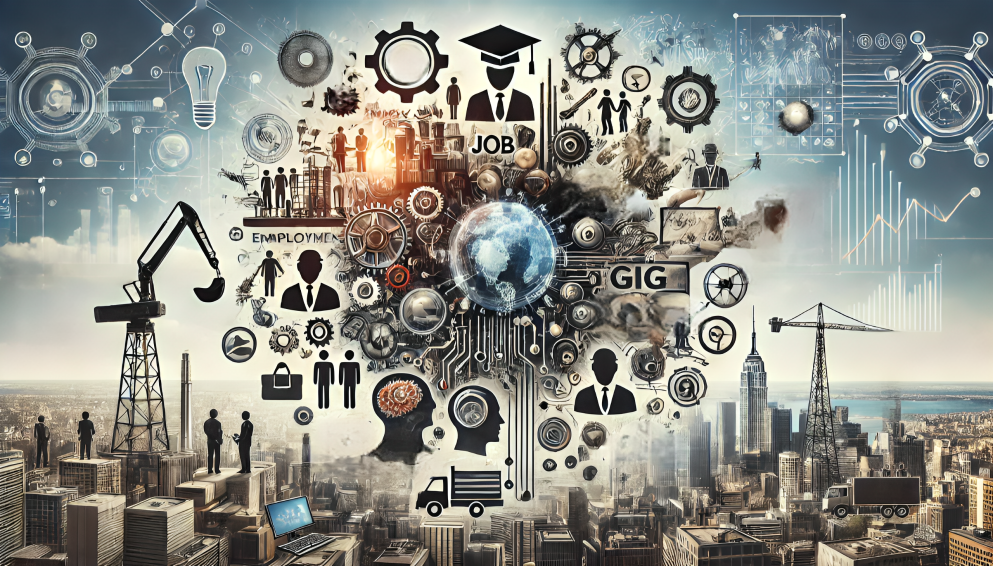Employment plays a critical role in shaping both individual lives and national economies. It drives economic growth, fosters social stability, and provides individuals with opportunities for financial security. We will explores key aspects of employment, including job creation, education’s role, employee rights, and the evolving nature of work. It also highlights pressing issues such as unemployment, government schemes, and the impact of technology. Understanding these elements is essential for navigating the complexities of today’s global labor market.
Employment

In a recent report from the International Labour Organization (ILO), India faces significant challenges in addressing youth unemployment and skills mismatches. The “India Employment Report 2024” highlights the need for stronger skill development initiatives to bridge the gap between education and the evolving job market. This calls for improved education systems and government schemes to address the growing demand for skilled workers
Job Creation and Economic Growth
- Job creation directly contributes to economic growth by driving demand for goods and services, which in turn stimulates business expansion.
- Employment increases productivity, contributing to GDP growth, which benefits the economy as a whole.
- As employment rises, it leads to increased consumer spending, a critical factor for sustained economic development.
The Role of Education in Employment
- Higher education significantly impacts job opportunities, opening doors to higher-paying and more advanced career paths.
- Skilled workers are more adaptable to technological advancements, which makes them more valuable to employers and enhances workplace productivity.
- Educational institutions bridge the gap between industry needs and workforce capabilities, preparing workers for the demands of modern job markets.
Employee Rights and Workplace Protections
- Labor laws ensure protection against exploitation, guaranteeing workers receive fair wages, job security, and safe working environments.
- Employee benefits, such as health insurance and paid leave, provide financial stability and improve well-being.
- Anti-discrimination laws ensure inclusivity by preventing bias based on gender, race, or other personal factors, helping create more diverse and fair work environments.
The Impact of Technology on Employment
- Automation and artificial intelligence (AI) are transforming industries by replacing manual labor in some sectors while simultaneously creating new roles in technology and innovation.
- Technology enhances business productivity by improving efficiency and reducing costs, which can lead to increased hiring in tech-driven sectors.
- Remote work opportunities have expanded due to technological advancements, offering workers more flexibility in balancing work and personal life.
The Gig Economy and Employment Flexibility
- The gig economy offers workers the ability to choose when and where to work, promoting a better work-life balance.
- Gig workers can diversify their income by taking on various short-term jobs through online platforms, enhancing economic freedom.
- However, the gig economy often lacks job security and benefits, raising concerns about the long-term stability of gig workers’ financial security.
Unemployment and Its Economic Effects
- High unemployment rates can severely limit consumer spending, which negatively affects businesses and slows down economic growth.
- Long-term unemployment can lead to skills degradation, making it harder for individuals to find work in competitive markets.
- Unemployment often exacerbates social and mental health issues, creating a vicious cycle of poverty and reduced productivity.
Government's Contribution to Employment
- Pradhan Mantri Kaushal Vikas Yojana (PMKVY): Provides skill training and certification to youth, enhancing their employability in various industries.
- PM Gati Shakti Employment Scheme: Aimed at creating jobs through infrastructure development, focusing on sectors like logistics, transport, and construction.
- Tax Incentives for Employers: Offers tax benefits to employers who hire first-time workers, encouraging job creation across industries.
Globalization and Employment
- Globalization allows businesses to outsource jobs to regions with lower labor costs, making production cheaper while boosting profits.
- It fosters cross-cultural exchanges and global work opportunities, which can enhance the skill set of the workforce.
- However, globalization can also lead to job displacement, particularly in industries that shift production to countries with more cost-effective labor.
The Future of Employment: Trends and Predictions
- Automation and AI will continue to transform the job market, replacing some jobs but also creating new, highly specialized roles in emerging sectors.
- The growth of remote work models and hybrid work arrangements will likely increase, allowing more workers to enjoy flexibility while companies adapt to attract talent.
- There is a growing demand for sustainable jobs, particularly in renewable energy, green technologies, and environmental conservation, which will shape the future job market.
Conclusion
Employment plays a crucial role in economic growth, societal well-being, and individual empowerment. It drives productivity, enhances consumer spending, and reduces poverty. While challenges such as unemployment, skills gaps, and technological disruptions exist, various government schemes like PMKVY and Gati Shakti aim to enhance employability and create jobs. As we look towards the future, fostering education, adapting to technological changes, and addressing unemployment will be key to ensuring sustainable and inclusive employment opportunities for all.
Practice Essay:
“Understanding Employment: Economic, Technological, and Social Influences“
5
1
vote
Article Rating
Subscribe
Login
0 Comments
Oldest
Newest
Most Voted
Inline Feedbacks
View all comments